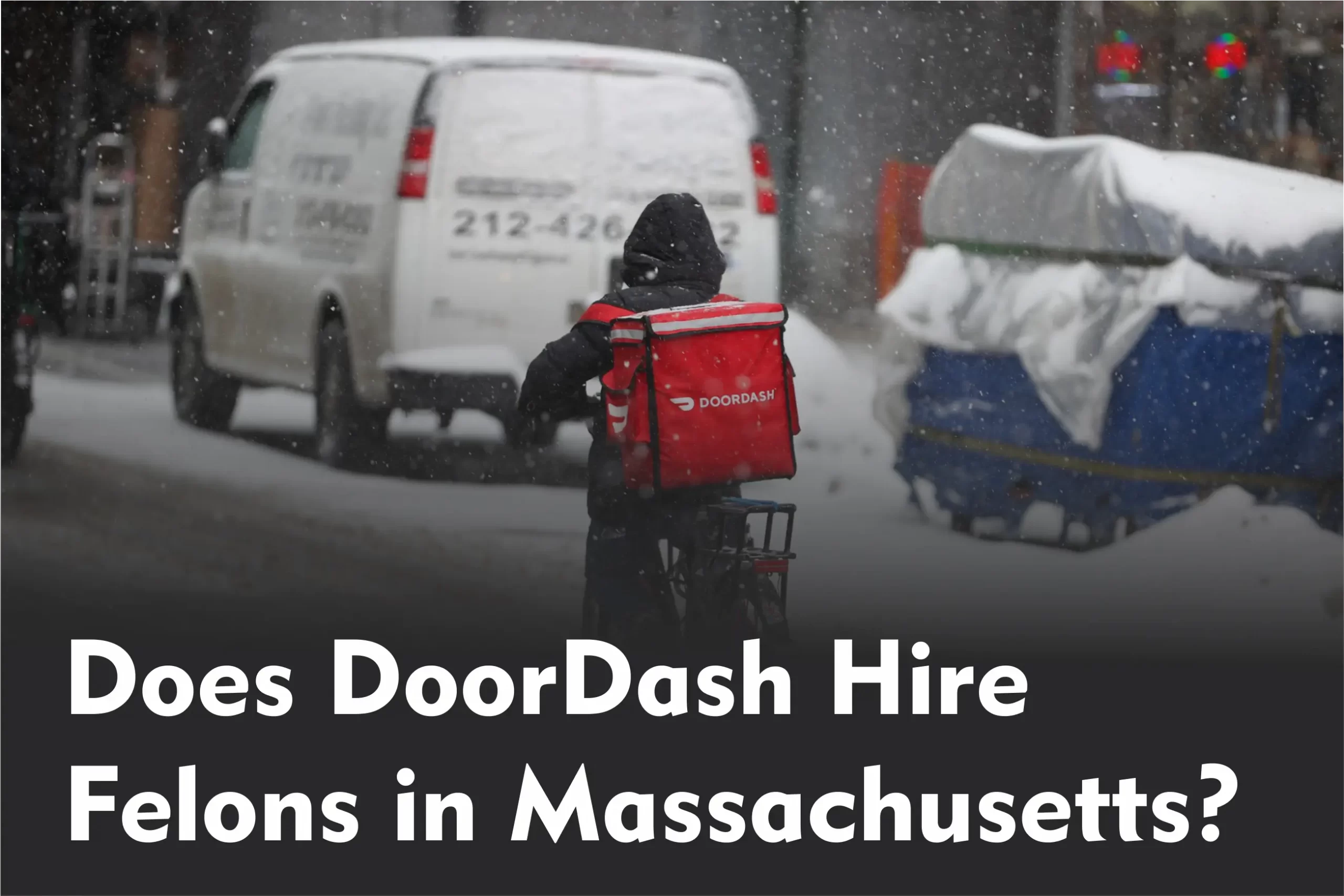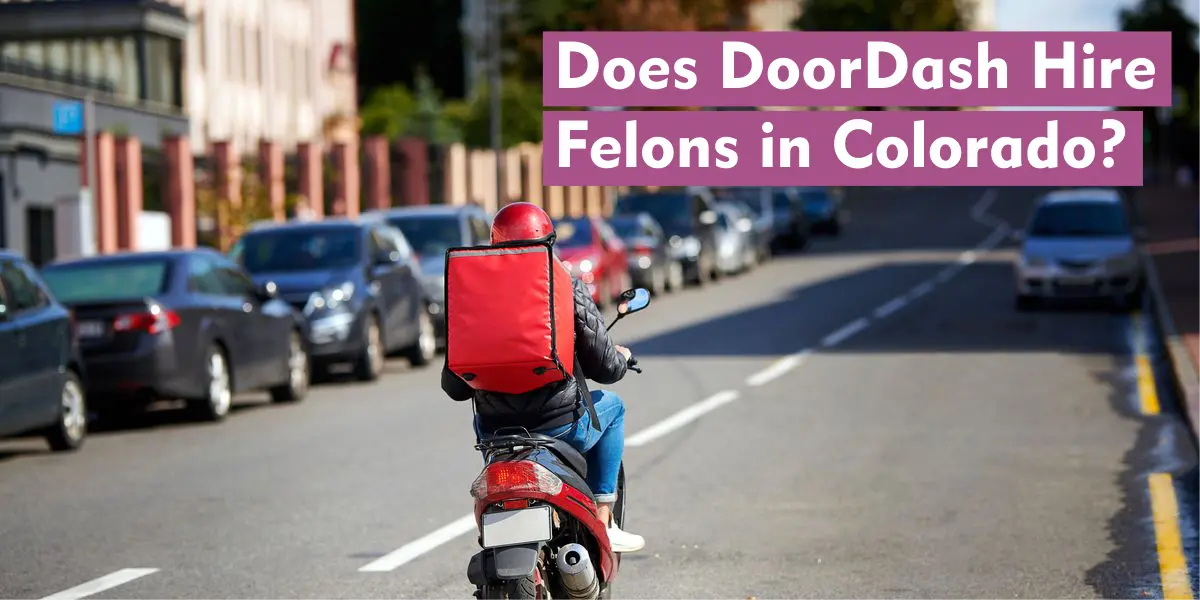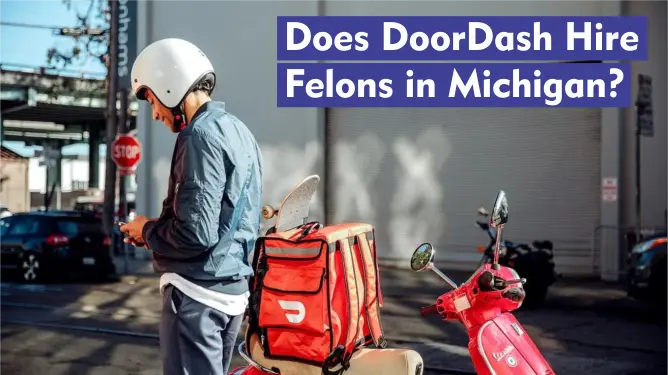DoorDash has a policy of not automatically disqualifying job applicants with a criminal history, including felony convictions. However, the company does conduct background checks on all potential drivers and may consider the nature and severity of any past offenses as part of the hiring process.
In New Jersey, certain felony convictions are eligible for expungement, which means they can be removed from a person’s criminal record. This may improve their chances of being hired by DoorDash or other employers who conduct background checks.

The importance of employment for felons cannot be overstated. Stable employment can provide financial stability, a sense of purpose, and a path towards a better future. For felons who face barriers to employment, finding a job with a company like DoorDash that values inclusivity and diversity can be a significant step towards success.
The purpose of this article is to provide information and resources for felons in New Jersey who are interested in applying for jobs with DoorDash. We will discuss the company’s policy on hiring felons, provide tips for applying and preparing for the hiring process, and offer guidance on navigating the background check process. Ultimately, our goal is to help felons in New Jersey find meaningful employment with DoorDash and take positive steps towards a brighter future.
Background Information
New Jersey’s criminal justice system is composed of a network of agencies, courts, and correctional facilities that work together to administer justice and provide public safety. The state has implemented various initiatives in recent years aimed at reducing recidivism, including expanding access to education and job training programs for incarcerated individuals and increasing support for reentry services for those returning to their communities.
Having a criminal record can significantly impact job opportunities for individuals, particularly for felons. Many employers conduct background checks as part of their hiring process and may be hesitant to hire someone with a criminal record, even if they have completed their sentence and are attempting to rebuild their lives.
Efforts to reform hiring practices for felons have gained momentum in recent years, with many states and cities implementing “ban the box” policies that prohibit employers from asking about criminal history on job applications. Additionally, many companies, including DoorDash, have implemented policies that prioritize inclusivity and diversity, including the hiring of individuals with criminal records.
Despite these efforts, barriers to employment for felons still exist, and many struggle to find stable employment after serving their sentences. Addressing these barriers will require continued advocacy, education, and support from both policymakers and employers.
DoorDash Hiring Policies
DoorDash has a policy of not automatically disqualifying job applicants with criminal records, including felony convictions. The company believes in second chances and values inclusivity and diversity in its workforce. However, DoorDash does conduct background checks on all potential drivers and may consider the nature and severity of any past offenses as part of the hiring process.
The DoorDash hiring process typically involves submitting an online application, completing an orientation session, and undergoing a background check. The background check includes a review of the applicant’s driving history and criminal record. Applicants must also have a valid driver’s license, insurance, and access to a vehicle or bicycle, depending on their preferred mode of transportation for deliveries.
DoorDash’s background check policy considers a range of factors when assessing an applicant’s criminal record, including the nature and severity of any offenses, the length of time since the offense, and the applicant’s overall driving and criminal history. The company may also consider any mitigating circumstances, such as completion of a rehabilitation program or expungement of past convictions.
While DoorDash does consider criminal history as part of its hiring process, the company does not have a strict policy of automatically disqualifying applicants with criminal records. Instead, the company evaluates each applicant on a case-by-case basis, taking into account the nature of the offense and the applicant’s overall qualifications for the job.
Overall, DoorDash’s hiring policies prioritize inclusivity and diversity, and the company is committed to providing employment opportunities for individuals with criminal records who are seeking a fresh start.
Felonies and Misdemeanors in New Jersey
In New Jersey, as in many other states, criminal offenses are divided into two categories: felonies and misdemeanors. The primary difference between the two is the severity of the offense and the potential penalty.
Felonies are considered more serious crimes and carry harsher penalties, including imprisonment for more than one year and fines of up to $200,000. Examples of felonies in New Jersey include murder, rape, robbery, and certain drug offenses.
Misdemeanors are less serious offenses and carry lighter penalties, including imprisonment for up to one year and fines of up to $1,000. Examples of misdemeanors in New Jersey include disorderly conduct, simple assault, and some types of drug possession.
When it comes to hiring decisions, employers may view felony convictions more negatively than misdemeanors, as they are considered more serious offenses. However, the impact of specific convictions on hiring decisions may vary depending on the nature of the offense and the job requirements.
For example, a conviction for theft may be viewed more negatively for a job that involves handling money, while a conviction for drug possession may be viewed more negatively for a job that involves driving or operating heavy machinery.
Ultimately, the impact of a specific conviction on hiring decisions may depend on a range of factors, including the employer’s policies, the nature of the offense, and the applicant’s overall qualifications for the job. However, individuals with criminal records may still be able to find employment opportunities with companies like DoorDash, which consider applicants on a case-by-case basis and prioritize inclusivity and diversity in their hiring practices.
Legal Considerations
Both federal and state laws govern the hiring of individuals with criminal records. The federal government has established guidelines for employers to follow when considering applicants with criminal records, including the Fair Credit Reporting Act (FCRA) and the Equal Employment Opportunity Commission (EEOC) guidelines.
The FCRA requires employers to obtain written consent from job applicants before conducting a background check and to provide a copy of the report if adverse action is taken based on the results. Additionally, employers must follow specific procedures when denying employment based on a criminal record, including notifying the applicant of the reason for the denial and providing them with an opportunity to dispute the accuracy of the record.
Anti-discrimination laws also impact hiring practices for individuals with criminal records. Title VII of the Civil Rights Act of 1964 prohibits employment discrimination based on race, color, religion, sex, or national origin, and the EEOC has issued guidance indicating that blanket policies against hiring individuals with criminal records may disproportionately impact certain protected groups.
As a result, many states and cities have implemented “ban the box” policies that prohibit employers from asking about criminal history on job applications or delaying such inquiries until later in the hiring process. These policies aim to level the playing field for job applicants with criminal records and reduce the impact of systemic discrimination.
The EEOC plays a critical role in enforcing anti-discrimination laws related to hiring practices. The agency investigates complaints of discrimination and works with employers to address any violations of federal anti-discrimination laws. The EEOC has also issued guidance and best practices for employers to follow when considering applicants with criminal records.
Overall, federal and state laws and anti-discrimination policies aim to protect individuals with criminal records from unfair employment practices while also ensuring that employers can make informed hiring decisions based on relevant factors. Employers like DoorDash have implemented policies that prioritize inclusivity and diversity, while also complying with applicable laws and regulations.
DoorDash and New Jersey Hiring Laws
New Jersey’s “ban the box” law, also known as the Opportunity to Compete Act, prohibits employers from asking about an applicant’s criminal history during the initial application process. The law aims to reduce discrimination against job applicants with criminal records and provide them with a fair chance at employment.
DoorDash, as a company that operates in New Jersey, is subject to the state’s ban the box law. The company has implemented policies to comply with the law, including removing questions about criminal history from its initial job application and delaying inquiries until later in the hiring process.
During the interview process, DoorDash conducts background checks on all potential hires and evaluates each applicant on a case-by-case basis, taking into account the nature of the offense, the time that has passed since the conviction, and the relevance of the conviction to the job requirements.
The impact of the ban the box law on DoorDash’s hiring practices has been positive. By removing questions about criminal history from the initial job application, the company has been able to attract a more diverse pool of applicants and provide a fair chance to job seekers with criminal records.
Overall, DoorDash’s compliance with the ban the box law demonstrates its commitment to inclusive and equitable hiring practices. The company’s policies align with New Jersey’s efforts to reduce discrimination against individuals with criminal records and ensure that all job seekers have an equal opportunity to compete for employment.
DoorDash’s Second Chance Program
DoorDash’s Second Chance program is a hiring initiative that provides job opportunities to individuals with criminal records. The program aims to support those who have faced barriers to employment due to past mistakes and provide them with a second chance to build a successful career.
To be eligible for the program, applicants must meet the following requirements:
- Must have a criminal record, including felonies or misdemeanors
- Must be 18 years or older
- Must have a valid driver’s license and insurance (for delivery driver positions)
- Must pass a background check and other pre-employment screenings
- Must meet DoorDash’s other hiring criteria for the position
Once accepted into the program, participants are offered positions as independent contractors, including delivery drivers and dashers. DoorDash provides training and support to help program participants succeed in their roles and grow their careers within the company.
Success stories of program participants are numerous, with many individuals reporting that the Second Chance program has changed their lives. One participant, Anthony, was released from prison with few job prospects but was able to secure a position as a delivery driver through the program. He credits the program with providing him with a second chance and helping him rebuild his life.
Another participant, Lisa, struggled to find employment after being released from prison. She applied for a position with DoorDash’s Second Chance program and was accepted as a dasher. Lisa has since been able to provide for her family and is grateful for the opportunity to rebuild her life and career.
Overall, DoorDash’s Second Chance program demonstrates the company’s commitment to inclusive hiring practices and providing job opportunities to individuals with criminal records. The program has had a positive impact on the lives of program participants, providing them with the support and resources needed to build successful careers.
Challenges for Felon Employment
One of the biggest challenges for felons seeking employment is the stigma associated with their criminal record. Many employers are hesitant to hire individuals with a criminal record, fearing that they may pose a risk to the workplace or customers. This stigma can make it difficult for felons to find job opportunities, even if they have completed their sentence and are committed to turning their lives around.
Another challenge is the lack of resources for job training and placement. Many felons may lack the skills or experience needed to secure employment in today’s competitive job market. Additionally, some may face additional challenges such as limited access to transportation, childcare, or affordable housing, which can further limit their job prospects.
To address these challenges, it is important to promote education and awareness about the value of hiring individuals with criminal records. This can include initiatives to educate employers about the benefits of second chance hiring and provide them with resources and support to make it easier to hire and retain individuals with criminal records.
Additionally, it is important to invest in job training and placement programs that provide felons with the skills and experience they need to succeed in the workforce. Programs like DoorDash’s Second Chance program can provide critical support and resources to help felons secure employment and build successful careers.
Finally, it is important to address systemic issues that contribute to the cycle of recidivism, including limited access to education and healthcare, and the lack of affordable housing and transportation. Addressing these issues can help to create a more supportive and inclusive environment for felons seeking to rebuild their lives and careers.
Alternatives to DoorDash
While DoorDash’s Second Chance program offers job opportunities to felons in New Jersey, there are also other companies and industries that may be open to hiring individuals with criminal records.
Some other companies known to hire felons in New Jersey include:
- Amazon
- Starbucks
- Home Depot
- UPS
- Waste Management
It is also worth exploring job opportunities in different industries, as some may be more open to hiring individuals with criminal records. Some industries that may be more forgiving of criminal records include construction, manufacturing, and hospitality.
When searching for job opportunities, it is important to be honest about your criminal record and to highlight any relevant skills or experience that you have. Networking can also be a valuable tool, as personal connections may be able to provide leads or referrals for job opportunities.
Additionally, there are resources available to help felons navigate the job search process and build their skills and experience. Local workforce development programs, community colleges, and vocational training centers may offer training and support for felons seeking employment.
Finally, it is important to remain persistent and to stay focused on your goals. Building a successful career after a criminal conviction can be challenging, but with determination, hard work, and the right support, it is possible to overcome these obstacles and build a better future.
Conclusion
In conclusion, DoorDash is among the companies that offer second chance employment opportunities for felons in New Jersey. While the company conducts a background check on all potential employees, it is important to note that DoorDash considers each candidate on a case-by-case basis and takes into account factors such as the nature of the offense, the time elapsed since the conviction, and evidence of rehabilitation.
Additionally, DoorDash’s Second Chance program provides felons with job training, support, and mentorship to help them succeed in the workplace. This program has had success stories of program participants who have built successful careers with DoorDash.
However, it is important to remember that there are other companies and industries that also offer job opportunities to felons in New Jersey. It is worth exploring these options and considering different industries where skills and experience can be transferable. Furthermore, it is crucial for felons seeking employment to remain persistent and to take advantage of resources available to them.
Overall, DoorDash’s second chance program and the opportunities they offer to felons in New Jersey provide a beacon of hope for individuals seeking to rebuild their lives and careers after a criminal conviction.
FAQs
What is DoorDash’s second chance program?
DoorDash’s second chance program is a program designed to provide job opportunities, training, support, and mentorship to individuals with criminal records, including felons. The program aims to give these individuals a second chance at building successful careers and lives.
How does the ban the box law affect DoorDash’s hiring process?
New Jersey’s ban the box law prohibits employers from asking about an applicant’s criminal history during the initial stages of the hiring process. DoorDash complies with this law by delaying its background check until after a conditional offer of employment has been made.
Can felons work as DoorDash drivers?
Yes, felons can work as DoorDash drivers, as long as they meet the company’s hiring requirements and pass a background check.
What other companies in New Jersey hire felons?
Other companies in New Jersey that are known to hire felons include Amazon, Starbucks, Home Depot, UPS, and Waste Management. Additionally, some industries, such as construction, manufacturing, and hospitality, may be more open to hiring individuals with criminal records.
How can felons improve their chances of finding employment?
Felons can improve their chances of finding employment by being honest about their criminal record, highlighting their skills and experience, networking, and taking advantage of resources such as workforce development programs and vocational training. Additionally, remaining persistent and focused on their goals can help felons overcome the challenges of finding employment after a criminal conviction.



